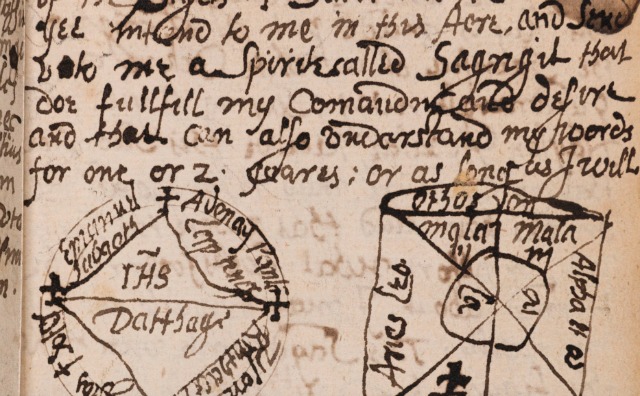Help The Newberry Library Transcribe These Medieval Texts About Magic & Witchcraft
By Stephen Gossett in Arts & Entertainment on Jul 6, 2017 3:25PM

'Book of Magical Charms' / Newberry Library
It's like crowdsourcing, but with more sorcery.
Chicago's venerable Newberry Library is asking for the public's help with what might be the coolest mass transcription project to ever hit our radar. The research library has uploaded to its website a handful of texts that date back at least to the 17th century—including real-life post-medieval manuscripts about magic and witchcraft—that users can help transcribe, translate and edit.
The "magical" text, called Book of Magical Charms, was written by two unknown authors in the 1600s in England. So far scholars have been able to determine that the manuscript contains everything from occult toothache remedies to prayers and litanies. Like The Commonplace Book, a post-medieval general-knowledge compendium of sorts that is also available online for transcription and edits, the text is written in old English and Latin.
The online portal of texts is part of Newberry's Transcribing Faith project, which in part explores the nexus between magic and religion during that far-off historical era. The collection went online for edits in May—and so far the response has been magical (sorry). The site has logged more visits in the past two weeks than some of the library's other digital platforms garner in a full year.
And the feedback has proven instructive, too. "These three manuscripts together"—The Book of Magical Charms, The Commonplace Book and The Cases of Conscience Concerning Witchcraft—"amount to 522 handwritten pages, 350 of which have already been at least partially transcribed," Alex Teller, Director of Communications for Newberry Library, told Chicagoist by email. New historical links have emerged, too, thanks to the public input. "In addition to these transcriptions, our digital volunteers have provided valuable contextual information, like certain connections between our manuscripts and manuscripts held in other collections."
"Ultimately, the crowdsourced contributions are making these manuscripts more accessible to researchers, and they're setting the stage for fresh insights about the coexistence of Christianity and magic as well as the role that religion played in private and public life in the 16th and 17th centuries," Teller added.
The transcription portal is part of a larger project called "Religious Change, 1450 to 1700," which features public programs and an exhibition at Newberry, starting in September. You can find more info about the full project here.
[H/T Atlas Obscura]